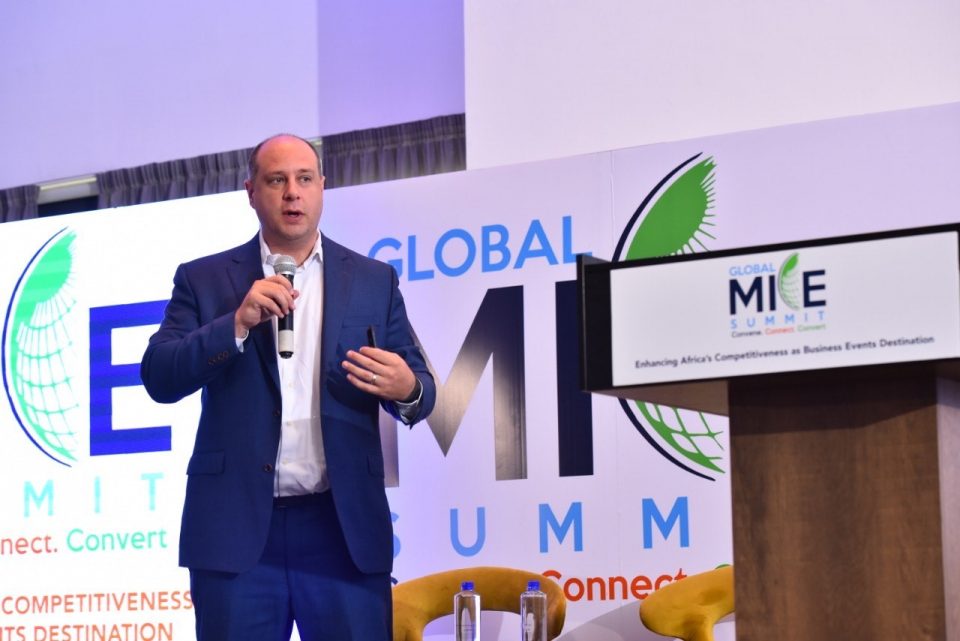Eric Schmidt is one of the lucky few who gets to travel the world to handle his business, EventBank.
As someone who has dived into the technology world as a student until becoming a technological entrepreneur, this co-founder and CEO of EventBank believes that technology can help social and economic factors of not just businesses, but also the people involved.
Eric sees both sides of the coronavirus pandemic. It profoundly brings challenges, yet at the same time, there are blessings in disguise. Indonesia Expat had the chance to chat with Eric via Zoom, where he discussed EventBank’s efforts to help businesses and communities to work efficiently with technology while also coming closing together, despite the lack of human interaction.
Please state your nationality and how often you visit Indonesia within a year.
I’m from the United States (US) and I generally come to Indonesia four to six times a year for the past six years. I also visit Bali for recreational purposes.
What brought you to Indonesia?
I was invited to speak on technology at a couple of events. Ever since then, the office in Indonesia was set up. I travelled more to Indonesia to learn about the market and see different organisations “go digital.”
So far, Bali has been my go-to holiday destination in Indonesia but I haven’t been there for a while now – not even for a vacation elsewhere.
Has anything surprised you since you first visited Indonesia? And what have you grown to love?
Certainly not the traffic. I don’t think anybody can ever love the traffic in Indonesia. Food is one of the best – there are so many kinds of foods to try and it never fails to impress me. Spicy foods aren’t even a problem for me, well, depending on the spiciness.
Can you please tell us about yourself?
I grew up in the US and then moved to China while also spending a lot of time across Asia. All in all, I’ve been in Asia for about 17 years. I love the dynamics, excitement, and energy in Asia. Then recently, I moved back to the US. I love being an entrepreneur to find solutions to problems and identify ways to improve people’s lives with technology. My career has mostly been as an entrepreneur in the technology sector.
What are you busy with these days?
EventBank has 11 offices worldwide. Within the past nine weeks, I would say, we’ve been dealing with EventBank’s initial impact of the coronavirus. EventBank has been learning to try and figure out ways to get better and trying to improve products to solve and ease customers’ pain points, as well as after this crisis is solved. Nevertheless, EventBank is helping existing customers and technology that could be built into the improvements of products.
You’ve studied technology at Rensselaer Polytechnic Institute for your Bachelor’s and Master’s degrees. In your opinion, how has technology evolved and shaped today’s technology industry?
I think it has obviously gone beyond technology with every business and how they incorporate technology into a part of their day-to-day lives more efficiently or on how they automate the process to get it better for their shareholders. Technology itself is a very big word but at the same time, the overall goal of using technology is to make things better.
As the co-founder and CEO of EventBank, how did EventBank form? What are the company’s aim, concept, and specialities?
EventBank was started out of a challenge that the other co-founder and myself had to face by running offline events. With that experience we had and running over hundreds of conferences, we realised that without technology, it would be difficult for us to scale. We researched the market and we didn’t find any solutions that could meet the needs. We believed that we could solve it ourselves, so in 2013, we set out to develop our own technology to solve problems we knew existed. Here we are now, seven years later transforming a lot of professions through our technology.
We resolved and brought together communities, associations, clubs, and organisations that are trying to bring people together. Before the coronavirus outbreak, we tried to help these groups to transition online. Technology has enabled these communities (profitable or non-profitable), focusing on how to make things better, but also bringing people closer. Bringing people closer and working more efficiently through technology has always been what EventBank has strived for. EventBank’s clients come searching for software to run their organisation; whether they are running events, they need a CRM to manage their customers or those associations need to automate their membership processes. On the other side is really about their communication whether that is through mobile phones, emails or trying to build online forms within the community to come together.
The coronavirus is swiftly spreading across the world now. How is EventBank holding up? Are there adjustments made by the company for the time being or will these continue after the pandemic is over?
EventBank’s product road map had to be adjusted. All of the customers who were running offline events can no longer hold those events. EventBank had to transition into helping our customers transition into online events and enabling that to EventBank’s platform.
EventBank is also striving towards the next step for organisations, including on how are they going to survive and transform their organisations. Hence, EventBank brings the community concept to the online platform. People want to relate to others, whether they are CPAs, lawyers, or part of an ecological group – it doesn’t matter if they have similarities, they just want to connect and bring their ideas and share their thoughts to learn together.
This is the purpose of (offline) events but now we can’t hold any events, so here we are taking that same concept and transforming it into the online world. Ways of the offline aspect that people want, in terms of the connection and relationships, can exist online that’s private as well as managed by organisations.
As an American, you have returned home during this global pandemic. What is the situation in the US according to your observation? How has working from home affected you?
I moved back to the US before the coronavirus outbreak. We had already looked into transitioning back to the US as EventBank has grown globally.
Since the outbreak happened, it has absolutely changed our ability to travel. This is the first time in seven years where I’ve been in the same city for more than two months – definitely a big transition. We’re entrepreneurs; it’s everything about adapting and overcoming. There’s always a different situation every day so we can just adjust to it. EventBank is adjusting and making sure that all teams are safe and taken care of.
The US, on the other hand, hasn’t been doing well. I know a couple of my friends who have contracted the virus. All we can do is take care of ourselves and be thankful for everyone on the frontlines. Besides health, death, and surging number of daily cases, people are also becoming unemployed. This is certainly a very unfortunate situation. We can just support as much as we can.
What would you say to someone who doesn’t adjust well as you are, during this work from home situation?
There are challenges as well as opportunities at this time. I have friends who find it challenging to work from home. Day to day, people have been moving forward. For some, it may be an opportunity to spend a lot of time with families – maybe even longer than they’d like. It’s also a great opportunity to get in check with our health. Moreover, we can take this time to thoroughly think about our businesses and ways to approach our careers.
Based on personal and business matters, what are you looking forward to be doing once the world is reportedly free from the coronavirus?
Freedom of travel. A part of having a global business requires me to spend time with partners as well as team members in different parts of the world. The travel industry will come back, it’s just a matter of when – so we can get back on the road.
Speaking of travelling, you mentioned that you’ve only been to Bali for your vacations in Indonesia. What is exactly the one destination, activity or food you’d like to experience in Indonesia?
My wish is to visit the Komodo dragons. It is one of the things that I’m waiting to do so, hopefully, I get the opportunity to do that soon.
As someone who travels a lot for work, what do you find different between Indonesia from your hometown or any other countries/cities to which you often travel?
Besides traffic? I don’t think there’s much difference. One of the best traits of Asia, in general, is the willingness and ideas to generate new ideas. People are friendly and are willing to communicate. I think everybody at the end of the day is willing to learn and help.
What is the biggest lesson you’ve learned as a technological entrepreneur?
There will always be challenges along the way but you just have to overcome them and keep moving forward.
Mention three words which describe you the best.
Global citizen and entrepreneurial.
Since you visit Indonesia quite often, would you consider moving here one day?
As crazy as Jakarta is, it has its charms too. But I think it should have been when I was a little bit younger.




